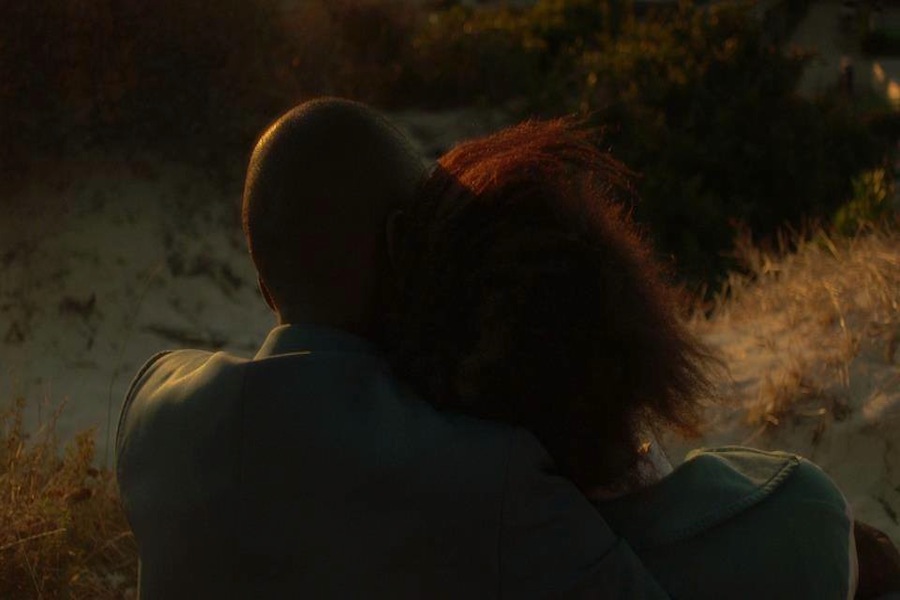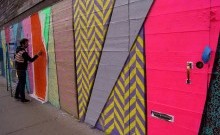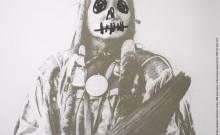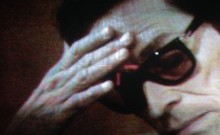An Innocent Look
"For me, the initial stop is enough of a problem for me to have problems with all of it. There doesn’t need to be a killing, a shooting, a wrongful arrest, or anything else. Just the idea of being stopped, when he’s not doing anything, it’s enough. He could have been doing something, but there’s no way of knowing that. Only suspicion, & it’s like, Why him, & not that other guy over there?"
__
A young girl returning home is accosted at night, in a slum city of corrugated tin shacks, by a group of young men. The incident is frightening, the threat palpable & thick as the air in Capetown, taking place in a season of masculine rites of passage. A young boy, returning home from school after baseball practice, is confronted by plainclothes police, who search & pat him down. Both emerge unscathed physically, but with the lines of trauma drawn deep in their faces --- young, innocent, & yet, now filled with a weariness far from what they deserve. Though one scene occurs in South Africa & the other in New York, the narratives & characters that surround them, the feelings invoked through the just barely incandescent figures in their frames, the weights so firmly placed upon their respective shoulders are the same.
Both scenes are born of the work of the same director, Reinaldo Marcus Green. Green, whose previous careers included time spent in the financial industry & the public school system, has managed with his most recent short form work to take the screen, & quite literally, the world by storm. His South African drama Stone Cars premiered at Cannes in 2014, going on to play at Telluride that same year, & his most recent work, the Red Hook-set Stop, debuted at Sundance last month. Both are portraits of youth on the outskirts of society, whose normality & sense of security & confidence are shattered by intrusions into their personal space by men with agenda. They are vividly shot, cast, & captured. I spoke to Rei Green in New York, just before he set out for Park City.
EVAN LOUISON: Bring me back to the time leading up to your first short, Stone Cars, which premiered at Cannes last year.
REINALDO MARCUS GREEN: I had shot a documentary in Capetown, there’s an organization called the International Theatre & Literacy Project, & they choose to work with one filmmaker a year. Basically, the organization teaches the principles of theatre & literacy to local communities, so they’re in different countries, including Rwanda. My brother had gone to Tanzania a few years before, so there was a connection with the program previously. He had made this really cool documentary there, & his pay was to go to this place he’d never been to before. So I spent the whole time applying thinking I would go to Tanzania, & then at the last minute, the plan changed, & they told me I’d be sent to South Africa instead. Completely different, & Capetown is a city just like elsewhere, but I had no idea we’d be going deep into the slums. It was really the first time, aside from being in Egypt once before, that I’d gotten to see that. I’m not a DP, but I had a camera, & a pretty good eye, & I was basically following this group of kids for three weeks. The teaching artists that teach the kids, you’re hearing their stories, & every day you’re going into the township & seeing these conditions & just being blown away by them. And I’ve been to some pretty bad places —- in Egypt, seeing kids with their arms cut off, Dominican Republic & Puerto Rico, the poverty there —- but nothing could have prepared me for what I encountered there. Imagine as far as the eye could see, just a sea of wall to wall one story corrugated tin shacks. That’s what it’s like there… but the kids were happy, so I came back & thought, I really shouldn’t complain about anything. At the time I didn’t realize it, but I was casting for my short. The girl in Stone Cars [Olwethu Anita April], I was so drawn to her while I was shooting this little promotional video for this organization, that she ended up being featured in it. It was just a natural thing —- she was so captivating, & her English was so well-spoken. It’s kind of cool there to communicate in English, so a lot of the kids speak it. And I felt so inspired that I wanted to come back & shoot something with them. They’re speaking Xhosa, which is their dialect. But we communicated in English. I found her, & these kids don’t have email addresses, but they do have Facebook pages. So I got back to the States & we stayed in touch that way. She was 16 at the time. She had told me some of the horror stories about what happened there, & I mean there’s no shortage, they all have them, but she had one of the best voices to speak about it.
EL: She was articulate?
RMG: Extremely articulate, & great on camera. All the kids were doing theatre, which was amazing, because these kids had never done anything on TV or a movie set. But they wanted to. I just decided I had to go back, & I did. I knew I was going there, cause I had all the access. I wasn’t South African, but the dollar was strong there as well, & I knew I could make something really self-contained. I had no idea what the movie was going to be. But it was 8 to 1 at the time —- I could stretch the dollar & give these kids an opportunity. You know, I said I was going to come back to all of them when I left, & I did. I think a lot of the time, with visitors to their culture, they say they’re coming back & they never do. And I just didn’t want that to happen.
EL: Tell me about the shoot.
RMG: It was me, the DP, my brother (Rashaad Ernesto Green, dir. Gun Hill Road) & a few other people. All in one van, the van you see in the movie. And it was all practical locations —- that house, that is where April actually sleeps. She sleeps on the floor. She lives there.
EL: You do that in both your films —- showing the character in the outside world, & then in the confines of their home, where they live, & at times rather inauspiciously. April’s home appears squalid.
RMG: Yes, but it’s only difficult for her to live there from the outside world perspective —- that’s the only world that she knows. It’s this strange thing.
EL: Yeah, she’d probably question our amenities as well.
RMG: It’d almost be too much. She’d feel it was excessive. You know, sometimes she might eat one, one & a half meals a day, but they all have phones, & a huge part of their life is social media. If anything, that is their life. It’s really interesting. That’s their way to connect to the rest of the world. They’d rather skip a meal, than miss the opportunity to connect with their “friends.” That was the impetus of going. Doing the short doc, that led me to the girl, that led me to the story.
EL: Is it based on her own experiences? [In the film, a young Capetown girl is accosted by a gang of young men, who surround her, menacingly)
RMG: She told me she’d been in a very similar situation, where she had been surrounded by a group of guys, nearly robbed, at knifepoint. They just wanted her phone really.
EL: It seems like she gets off easy knowing what there is to know about South Africa & rape culture there, & yet still it’s so frightening to watch.
RMG: That was a personal choice I think, for me. I didn’t want to vilify the guys, because really, it’s just about survival for them. A lot of the time, if they beat you up, it’s just because they want something —- you have something they don’t have. Here’s a girl who has holes in her clothes, & yet she’s being robbed. She has almost nothing, & yet still, she might have more than the guy living next to her. It was crazy to me. So I had to figure out a narrative around it, to build it. The film became something about what a male’s perspective is of a woman’s body.
EL: You have this rite of passage alluded to in the first half of the film, about young men losing their virginity.
RMG: Yeah that came in later. I just kept thinking about where I would fit into all of this, how uncomfortable it was when I lost my virginity. And I heard about the Mountain [a ritualistic site visited by all young men, in order to become men], & that came to be a thing that drove the whole story.
EL: It’s alluded to in the beginning, but really the only time you ever see any convergence of young men in the film, it’s when they’re gathering together in a swarm, to set upon her in the street. And then it’s that event that serves as the impetus for her to take the plunge with her boyfriend, & lose her virginity the same night. It’s her caught in the middle of these rituals, & yet the whole thing revolves around her, though she remains separate.
RMG: As we were shooting we saw these guys, really dressed up. And everyone was, dressed in uniforms for school, but then you see these young guys, with canes, hats, & everyone explained: they just came back from the mountain. It was a real thing. Nelson Mandela did it. Everyone goes to the mountain & you’re not considered a man until you go there. We start the film & end the film on a mountain, but we never see what goes on there. We used the reality as much as we could, again though, I’m not South African. I told them what the scene was about, & the kids were able to orchestrate that with me. A lot of the time they were nailing it on the first take. They would be like, “Oh, you want me to do that?”, & then just do it. It was almost like TV, you know?
EL: Like the TV version of making a movie.
RMG: Yeah, like “What do you mean do I want to do it again? Did you just see that? It was perfect.” We didn’t have to keep doing things because it felt real. It was an organic way of observing life.
EL: It’s very unassuming, & relates a lot of its ideas about the world through the image, & the painterly composition of the image. It doesn’t assume too much in terms of telling you what it’s about. You get more about the composition & the visual narrative in general than what the characters say.
RMG: For me it was important to remain objective. For me, it wasn’t about the closeup of the garbage. This wasn’t about that. There’s documentaries that are made all the time about this place & places just like it. And I love those films, my shooting style comes from that kind of filmmaking. But docs don’t reach as far of an audience as a narrative. I wanted to create a narrative, fiction, that could be placed in an environment we’re only used to seeing in a documentary format. And we did make stuff up, it’s just closely related to her [April’s] life.
EL: It’s treated, all of it, with a certain normality. There’s never a misconception about it being staged, but it doesn’t exploit any of the squalor or poverty. Which is what happens in a lot of films when people go to a foreign country & cast locally, it begins to feel exploitative at times. You don’t get that out of this movie. There’s no judgement.
RMG: That’s exactly what I wanted to avoid. It was just an effort to keep it real, you see: you’re going into a country that’s not yours, making a picture of a story that’s not yours, & we went into it wanting to make it so that they could claim ownership of the film as well —- You know it’s theirs. It was their voice. They gave me a film, it was incredible to be a part of. In that last scene, she ends up breaking down, & I didn’t have to tell her anything. She did it all by herself. A lot of this was happening in real time for her.
EL: The performer was discovering it concurrently with the character.
RMG: I couldn’t cut the footage because it wasn’t in English, so we had a basic assembly just from the shooting script, a basic idea of what it was supposed to be like, but we needed a translator. And the translator came in, & she started to cry. She was South African. And more than anything, I just felt like if it was speaking to her, that much I knew I had. That was the moment when I knew I had something pretty special.
EL: You worked with Federico Martin Cesca on both films. How did that relationship come about?
RMG: He’s an NYU guy. He also has a feature at Sundance [Cronies, dir. Michael Larnell] this year. He had done some really great work in the year before, & I went to some DP screening there, & I always think it’s so hard to watch a reel & get a picture of what a person can do, because they’re all like, the guy’s best shot, you know? I really need to see a film. But I saw his & really liked it, & I didn’t have a DP up until a couple weeks out from when we were supposed to leave, & we met up, & I didn’t even watch the reel again, it was just a conversation. And the way he sort of broke it down visually just from the script alone, coupled with the fact that he never asked me about money or what camera we were shooting on —- he didn’t care —- that made it click. He thought he could do it with whatever the tools were, he just wanted to do it. I really respected that way of approaching it. We ended up shooting on the Sony F3, which NYU actually provides. A lot of people were spending thousands of dollars on camera packages, & I felt like we should do what we could with what we had.
EL: They looks amazing, both films.
RMG: Yeah it’s a great low-light camera, I mean, we were shooting in Africa, at night, we had no lights there. And Federico just says, no problem we’ll make it work. It was crazy. I’m saying no lights at all. It seemed impossible. And I give a lot of freedom to him with the camera. He’s kind of like a dancer on the set. There’s something organic about the way he shoots, getting it in that one take type situation where you would be traditionally cutting back & forth in coverage. In Stone Cars we have this incredibly long shot of her being confronted by the gang & people always refer to it as a rape scene. I tell them there’s no rape scene in the movie, they say no, the rape scene. But she’s not raped physically. It’s psychological. Federico helped make that happen. He knows how to move & how to dance, & sometimes I’ll tell him to move a little closer or stay longer on someone, so sometimes we’re dancing as he is.
EL: It’s pretty controlled, & really graceful. But it’s a very different feeling on the ground when you’re shooting as well, I’m sure it’s nowhere near as secure as you’d like it to be, or even as much as it looks.
RMG: We were working with a South African producer who was our access point there. They took care of us, but we couldn’t really shoot at night. It was more of a get there, get your shot, get out kind of thing. You couldn’t really stick around very long.
EL: It’s dangerous.
RMG: It’s intense. We notified the police, & even they told us: Listen, after a certain point, we can’t even protect you. There’s no street lights, you can’t see, & as soon as someone sees a camera, you don’t even know what hit you & then it’s over. We didn’t push any sort of boundaries too crazily. I mean, literally as soon as we brought the camera out, anytime, you don’t even see these people, but they see you, & as soon as the camera’s there, crowds form. It’s just some sense that something’s happening, & then they’re coming out of the woodwork. But everyone was super supportive, & we had local people with us, so we felt protected. I don’t think we ever felt like we were in danger.

EL: How do you go from that to making something in New York again?]
RMG: Well I felt like I had to make something in New York. I’m from New York. And I felt like I needed something to establish myself here, as a filmmaker who works here. I’ve done some stuff here, but never shot a whole film. I needed to do something, & when I think about New York, think about who I am, as a black man, these are the types of issues I face. So it was kind of a situation where I was trying to think what I could say about everything that’s happening currently. And it’s funny, cause we shot Stop way, way before any of this stuff that happened over the last year —- Ferguson, Eric Garner. It just happened to come out now. We shot it rather directly after the Trayvon Martin case occurred.
EL: After his murder?
RMG: No, after the decision. That’s when I was really taken aback by the whole situation. My opinion doesn’t really matter, but essentially it was a kid who was walking in a place, that maybe he shouldn’t have been walking, but that he had every right to do so. It turned out pretty ugly.
EL: I’d say it’s a pretty expensive fine for trespass.
RMG: I think so too. And there’ve just been a number of cases like that.
EL: He was so young, I think that contributed to some of the outrage. Not that it should ever be looked at anything normal, but if you look at history, it doesn’t appear to be anything new. When it’s a little boy, which is what he was, it gives pause, makes people think who might never have heard about another, similar case of a different age.
RMG: A young man’s life was taken —- & for what? Wrong place at the wrong time? No. The initial idea came from the decision itself. I was in New York, not Florida, but it was all over the news.
EL: I remember exactly where I was.
RMG: Where were you?
EL: I was on a bus, stopping in Charlotte, NC, waiting for another bus.
RMG: And there were a bunch of people protesting?
EL: No, it was one woman. One single lady holding a little sign, & everyone was just walking right by her like nothing had happened. I passed her & realized they must have acquitted him. But that experience to me isn’t even new, yet still the outrage stings the same & feels the same. The first time I can remember was with the Diallo case in the Bronx [Amadou Diallo, 22 year old Guinean immigrant shot by NYPD 19 times & killed, 1999). Even if you only monitored the internet outrage, you’ll find over & over again people asking, How could this happen, how could this happen, etc… And it’s a pattern that seems to surprise people still.
RMG: For every case you hear of, there’s hundreds you don’t hear about at all. This is happening all the time. All the time. We’re lucky that the Michael Brown situation got attention, so that people can realize it’s still happening. You go to the Red Hook projects right now, it’s happening. Every day. All day. In New York, it’s a very common thing. There’s a doc out right now also called Stop which is about stop-and-frisk. It’s got a lot of good statistics.
EL: Everyone in New York seemed surprised it became an official policy, or at least referred to as such. I remember reading about it & thinking, Doesn’t sound that different from what they’ve always done. They’re always stopping people. Dark skinned people. Always hassling young men, cause they’re seen as a threat. All they did now was give it a name, but it seems like a game that’s as old as time.
RMG: I have friends, some of my best friends are cops. They’re great guys, but I don’t necessarily agree with all the practices of the institution. For me, the initial stop is enough of a problem for me to have problems with all of it. There doesn’t need to be a killing, a shooting, a wrongful arrest, or anything else. Just the idea of being stopped, when he’s not doing anything, it’s enough. He could have been doing something, but there’s no way of knowing that. Only suspicion, & it’s like, Why him, & not that other guy over there?
EL: The way you relay the information sequentially, it could give rise to different interpretations of it. There could be a reason they stop him. Something we don’t know about, that maybe we’re going to find out about. You sort of trick the audience for a moment there, where they think the cops are gonna find something, like there might be cause for all of this to happen to a kid. Then you realize that it has nothing to do with anything, it’s just completely random.
RMG: There’s just suspicion.
EL: Who’s the kid in the picture?
RMG: It’s his first time acting, Keishawn Butler is his name.
EL: From his expression, you can tell he’s just a scared kid. He doesn’t even appear fearful or incensed by them accosting him, but he does seem confused & timid around the officers. That’s the moment when you realize that this whole little incident is a commonplace, & that it is exactly what it looks like —- nothing. It has no cause, they’re just hassling him.
RMG: Even if it’s just at the airport, for whatever reason, & maybe it’s just in my head, but it seems like my baggage checks are significantly longer than others’.
EL: (laughter) I know mine are extremely detailed. I’m always amazed. They must be looking at everything in there for it to go on for this amount of time.
RMG: (more laughter) Mine always beeps just a few times more than other people’s…And like I said, maybe it is just in my head that I’m a target of some sort, but maybe that’s it too —- that somehow, I’m a part of my own fear, that my fear reads as guilt.
EL: The real problem here is that they’re reading guilt on the faces of people who are just afraid of them, & legitimately afraid because they can lock them up, they can hassle them.
RMG: Right, & of course the kid’s jumpy. Wouldn’t you be jumpy if they stopped you? It’s a whole thing growing up in certain neighborhoods: you fear the bad guys, because they pose a threat to you. And then you also have to fear the ones who are supposed to be there to protect you, who are supposed to be the good guys, because they think automatically that you’re one of the bad guys, that you’re doing something bad because you come from a bad neighborhood. So you’re kind of walking on eggshells.
EL: The kid is so docile, it’s really interesting. It’s obviously accentuated because it’s a performance, but even the way the detectives look at them, the interaction between their eyes, is so penetrative.
RMG: Those are real cops, who are also actors. Friends of mine. We did it about 5 or 6 times, & I didn’t want to do it anymore, because I thought the more aggressive form of it didn’t work as threateningly as the calmer versions of their questioning him.
EL: It’s aggressive as is.
RMG: The calm is aggressive.
EL: Hey buddy, have a good night! Just a good guy, doing my job!
RMG: Any number of things can happen. Keishawn, who again, this was his first time on camera. He came to my place & I asked him, has anything like this happened to you before? And of course, he said “Actually yeah, this happened to me last week.” The way he was so nonchalant about it, not in any way like he had this story to tell me —- it’s that normal. I cast him because he has such an innocent look.
EL: Doe-eyed.
RMG: Yeah, it’s great. And he’s not an actor. And there is something innocent to being on camera when you’re not from that world.
EL: The way that he interacts with everyone he interacts with is the same —- his friend, his mother, the Police. They take that aspect of his personality & highlight it under extreme circumstances & make it seem like guilt. It draws a lot of lines to the question of whether or not this person could ever be considered a threat. What it really implies is that anyone, any stranger, unidentified, male, of a certain color, & at night —- is dangerous.
RMG: In a way, he’s raped psychologically, just as April is in Stone Cars.
EL: It’s the same culture ultimately.
RMG: It’s rape culture, definitely.
EL: Do you feel drawn to these types of narratives, these types of characters?
RMG: Just as Stone Cars happened organically, Stop happened organically. I’m drawn to a lot of different stories. My first film is a comedy. Essentially, at the bottom, everything is tackling real-life human issues, & I think that’s a thread you can see whether they’re comedy or drama. There’s some kind of message from my heart in there.
EL: A lot of the characters are experiencing rites of passage —- if only by the implication that none of these things that happen to them are happening for the first time. It really is about the unfortunate initiations in place between adolescence & adulthood.
RMG: I’m drawn to the youth. I think we all are. The energy they have… I used to teach too, & you could feel it in the classroom. I want Keishawn, when he watches the film, to take something positive from it, as much as I want it for anyone.
EL: Previous life huh?
RMG: Yeah, previous lives, I’ve had a few. I think this one’s gonna stick.
EL: I should hope so. It’d be our loss if not.
Stone Cars is currently available on HBO. Stop was acquired by Conde Nast in Park City.
All images © Green Brothers Films
Portrait of the artist by Ignacio Carballo
















